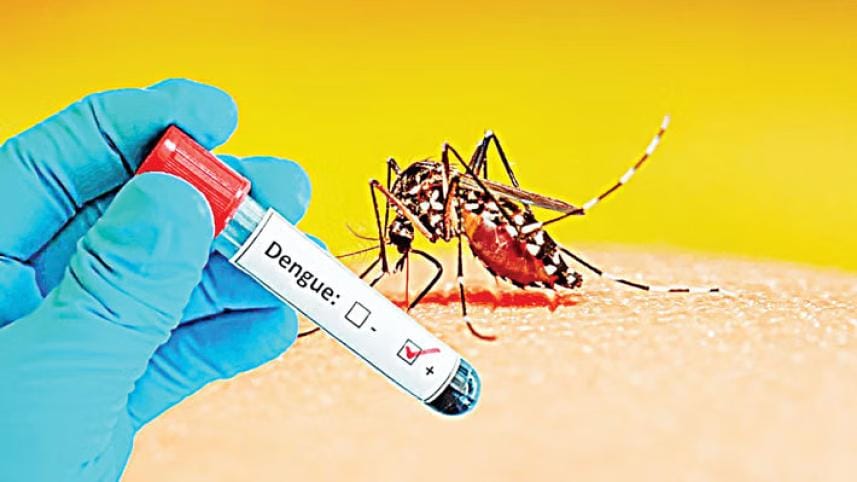DSCC tops in dengue deaths, Barishal in cases

Dhaka South City Corporation (DSCC) has recorded the highest number of dengue-related deaths this year, while Barishal tops the country in terms of dengue cases until yesterday.
The DSCC reported 83 deaths from the mosquito-borne disease, with 19 deaths reported in Dhaka North City Corporation, according to data from the Directorate General of Health Services (DGHS).
Among the divisions, Barishal and Chattogram saw 22 deaths each, followed by 10 in Rajshahi.
Khulna and Mymensingh reported 5 and 4 deaths, respectively, while two deaths were recorded in Dhaka division outside the city corporations.
No deaths have been reported this year from Sylhet and Rangpur divisions.
When it comes to reported cases, Barishal leads with 11,927, followed by Chattogram with 6,256.
The DSCC recorded 6,270 cases, DNCC 4,290, and Dhaka division outside the city corporations 5,894. Rajshahi reported 2,781 cases, Khulna 2,074, Mymensingh 822, Rangpur 278, and Sylhet 114.
According to DGHS data, the total number of deaths stood at 147 and cases at 40,709 this year, as of yesterday.
Experts stressed the urgent need for stronger control measures against Aedes mosquitoes, alongside community engagement for sustainable results.
Entomologist Kabirul Bashar said districts like Barishal, Rajshahi and Khulna are facing higher case numbers, while Sylhet and Rangpur remain significantly lower.
He attributed Sylhet's low prevalence partly to the naturally smaller Aedes mosquito population in the region.
Bashar also warned that the outbreak's peak, delayed earlier by heavy rains, is now expected in October.
He urged for a community-driven mosquito control initiative, including the distribution of Insect Growth Regulator (IGR) tablets and school involvement, as municipal measures alone are inadequate.
Entomologist GM Saifur Rahman said lower case counts in Sylhet and Rangpur are linked to less commercial activity and reduced need for water storage, unlike southern coastal areas where storing water is common.
He noted that higher case numbers in other areas are partly due to larger populations of susceptible individuals with no prior dengue exposure.
He also criticised the absence of a systematic national mosquito management programme, calling it a key obstacle to long-term dengue control.
Explaining the high death toll in Dhaka South, Dr HM Nazmul Ahsan, associate professor at Shaheed Suhrawardy Medical College Hospital, said many critically ill patients are referred from outside the capital.
"They are infected in other districts but die in Dhaka hospitals. Delays in referral are another major factor. A patient from Barishal or elsewhere may need hours to reach Dhaka, and if already in shock, the delay can be fatal," he said.
Dr Ahsan urged district-level hospitals to strictly follow national dengue treatment guidelines and treat patients locally, transferring only those in severe condition.
He warned that premature referrals and failure to stabilise patients before transfer often result in deaths from decompensated shock.




 For all latest news, follow The Daily Star's Google News channel.
For all latest news, follow The Daily Star's Google News channel.
Comments